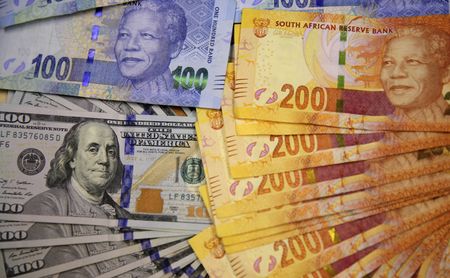JOHANNESBURG (Reuters) -South Africa’s rand weakened against a stronger dollar on Friday, as accelerating wage growth in the United States and a lack of progress in Russia-Ukraine peace talks weighed on appetite for risky assets.
At 1620 GMT, the rand traded at 14.6750 against the dollar, 0.49% weaker than its previous close.
Talks between Russia and Ukraine resumed online on Friday, while Russia said a first-of-its-kind cross-border raid by Ukrainian helicopters had set a fuel depot at a military logistics hub ablaze.
Investors were also digesting March U.S.
jobs data, with the unemployment rate dropping to a new two-year low and wage growth speeding up, adding to expectations the Federal Reserve will raise interest rates 50 basis points in May.
“The rand has over the course of the week thus far made a number of forays sub the 14.5000 technical support level, and on each occasion, the local unit has failed to consolidate these gains,” Nedbank analysts wrote in a note.
Even though the uncertainty over the war in Ukraine and the Fed beginning to raise rates have impacted the rand, the currency has remained resilient thanks to higher commodity prices that benefit the resource-rich country.
The rand has strengthened more than 8% this year.
Investors focusing on South Africa have also been waiting for Moody’s review of the country’s sovereign credit ratings, scheduled for Friday.
Moody’s has South Africa’s long-term foreign-currency rating on Ba2 it has a negative outlook.
Its long-term local-currency rating is also at Ba2.
In fixed income, the yield on the benchmark 2030 government bond was unchanged from the previous close at 9.600%.
The Johannesburg Stock Exchange all-share index closed 0.54% higher at 75,908, while the blue-chip Top 40 index ended up 0.62% at 68,935.
Gains were led by energy companies and technology investor Naspers and its company Prosus.
Northam Platinum fell the most on the Top 40 index, down 3.1%, after it reported a rise in half-year earnings and its CEO said a minority stake in a company it had failed to take over gave it a “position of strength”.
(Reporting by Olivia Kumwenda-Mtambo and Rachel Savage; Editing by Lincoln Feast.)








